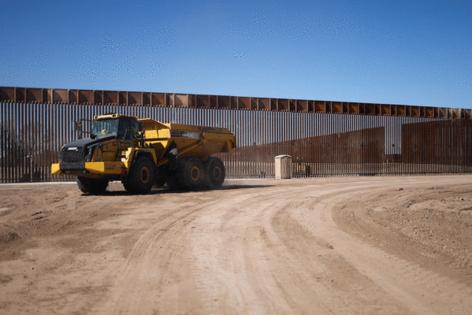Supreme Court may restrict asylum claims from those arriving at the southern border
Published in Political News
WASHINGTON — The Supreme Court agreed Monday to hear a Trump administration appeal that argues migrants have no right to seek asylum at the southern border.
Rather, the government says border agents may block asylum seekers from stepping on to U.S. soil and turn away their claims without a hearing.
The new case seeks to clarify the immigration laws and resolve an issue that has divided past administrations and the 9th Circuit Court of Appeals.
Under federal law, migrants who faces persecution in their home countries may apply for asylum and receive a screening hearing if they are "physically present in the United States" or if such a person "arrives in the United States."
Since 2016, however, the Obama, Biden and Trump administrations responded to surges at the border by adopting temporary rules which required migrants to wait on the Mexican side before they could apply for asylum.
But in May, a divided 9th Circuit Court ruled those restrictions were illegal if they prevented migrants from applying for asylum.
"To 'arrive' means 'to reach a destination,'" wrote Judge Michelle Friedland, citing a dictionary definition. "A person who presents herself to an official at the border has 'arrived.'"
She said this interpretation "does not radically expand the right to asylum." By contrast, the "government's reading would reflect a radical reconstruction of the right to apply for asylum because it would give the executive branch vast discretion to prevent people from applying by blocking them at the border."
"We therefore conclude that a non-citizen stopped by U.S. officials at the border is eligible to apply for asylum," she wrote.
The 2-1 decision upheld a federal judge in San Diego who ruled for migrants who had filed a class-action suit and said they were wrongly denied an asylum hearing.
But Solicitor Gen. D. John Sauer urged the Supreme Court to review and reverse the appellate ruling, noting 15 judges of the 9th Circuit joined dissents that called the decision "radical" and "clearly wrong."
In football, a "running back does not 'arrive in' the end zone when he is stopped at the one-yard line," Sauer wrote.
He said federal immigration law "does not grant aliens throughout the world a right to enter the United States so that they can seek asylum." From abroad, they may "seek admission as refugees," he said, but the government may enforce its laws by "blocking illegal immigrants from stepping on U.S. soil."
Immigrants rights lawyers advised the court to turn away the appeal because the government is no longer using the "metering" system that required migrants to wait for a hearing.
Since June 2024, they said the government has restricted inspections and processing of these non-citizens under a different provision of law that authorizes the president to "suspend the entry of all aliens or any class of alien" if he believes they would be "detrimental to the interests of the United States."
The government also routinely sends back migrants who illegally cross the border.
But the solicitor general said the asylum provision should be clarified.
The justices voted to hear the case of Noem vs. Al Otro Lado early next year and decide "whether an alien who is stopped on the Mexican side of the U.S.-Mexico border 'arrives in the United States' within the meaning" of federal immigration law.
©2025 Los Angeles Times. Visit at latimes.com. Distributed by Tribune Content Agency, LLC.
























































Comments